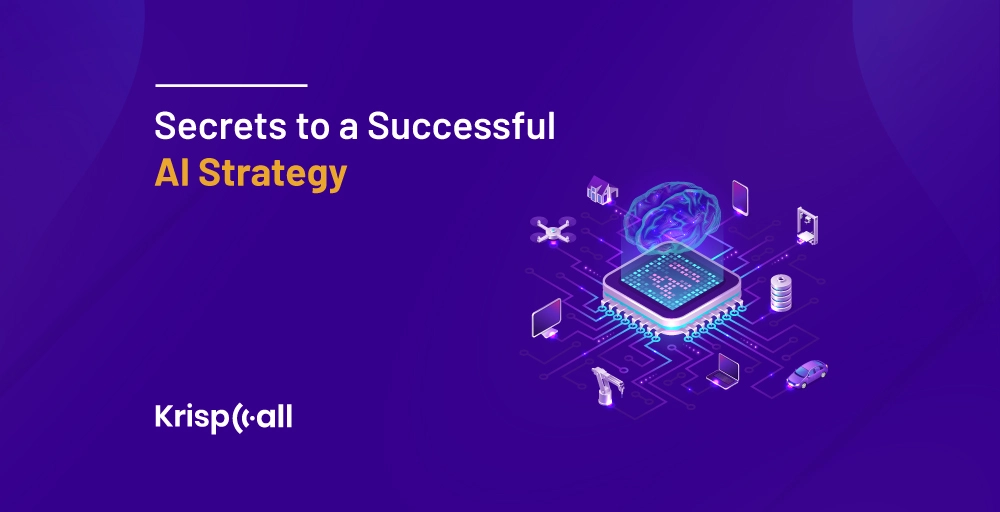Thinking 🤔 of implementing AI in your business for success? If yes then building a proper AI strategy is necessary 😃.
Today, over 77% of companies are either using or exploring the use of AI. This means that many new or upcoming businesses have implemented it, but are still struggling. Leading to questions about how to implement AI properly. The answer to this is building a proper AI strategy.
AI strategy is a roadmap for businesses that are looking to leverage the power of AI to grow. By developing and implementing a proper strategy it can be your biggest asset to help you upscale your business.
This blog will unveil the secrets to crafting a well-defined AI strategy that unblocks real value for your business.
🔑 KEY HIGHLIGHTS
- AI strategy is a blueprint for introducing and implementing Artificial Intelligence into your business.
- Better decision-making, increased efficiency, improved customer experience, and reduced business costs are some of the benefits of implementing an AI strategy.
- Key components of an AI strategy include aligning business goals, developing a data strategy, and building an AI team.
- Creating a successful AI strategy for your business involves defining goals and challenges, evaluating your AI readiness, and crafting a data strategy.
What do you mean by AI Strategy?
An AI strategy is a plan or blueprint that an organization, government, or individual develops to utilize Artificial Intelligence (AI) to achieve specific goals and objectives. In simple terms, it is a plan to leverage the power of AI in your business to achieve certain goals.

A successful AI strategy is necessary for your business as it helps you pave the way for your business to a new height of success. Depending on the type of business you are operating, the AI strategy might differ but the value you get by implementing it will remain the same.
What are the Benefits of Implementing a Successful AI Strategy?
A well-crafted and implemented AI strategy can bring a multitude of benefits to business, transforming operations and driving success.
Here are some of the benefits of implementing a successful AI strategy:
Better Decision Making
By utilizing AI you can get valuable insights from all the data accumulated which helps you to perform more enhanced and data-driven decision-making. Just as stated in the McKinsey report, companies that utilize data-driven decision-making are 23 times more likely to outperform their competitors. By leveraging AI, your business can get access to such valuable data and gain a competitive edge.
Increased efficiency
Implementing AI into your business saves you the hassle of repetitive tasks. By automating minimal tasks, AI saves your employees time. This makes it easier for them to focus on higher-value activities that require creativity, strategic thinking, and human connection.
According to the survey held by Forbes Advisor, 64% of businesses stated that artificial intelligence helps them to increase their overall productivity. This fact offers you an overall insight into how important AI is to increase efficiency for your business.
Improved customer experience
AI leverages you to personalize your interactions and provide 24/7 customer support with the help of chatbots or virtual assistants. In addition, businesses can use AI to solve general inquiries
AI-personalized product recommendations resolve queries efficiently, and streamline the customer journey, leading to higher satisfaction and loyalty. According to Verint reports, 80% of customers expect chatbots to improve their experiences due to faster resolution, tailored offers and promotions, and more. This alone indicates the power of AI when it comes to improving customer experiences.
Reduced business costs
Leveraging AI in your business can reduce your business costs. By introducing AI tools and algorithms into your business, you can easily improve decision-making, automate repetitive tasks, and enhance your overall efficiency. This helps you lower production costs, reduce resource wastage, and increase productivity.
Improved speed of business
Speed is one of the necessities in the modern world of business and AI offers you such leverage. AI plays a crucial role in reducing business cycle times and expediting transitions between stages, ultimately enhancing the speed at which Return On Investment (ROI) is achieved. As a result, businesses are already moving at a rapid pace in the digital era, and AI helps them to move even faster.
What are the Core Components of an AI Strategy?
A successful AI strategy goes beyond just deploying cool AI tools. It’s a roadmap for integrating AI into your organization in a way that drives real business value.
Here are the core components of a strong AI strategy:
1. Aligned Business Goals
To unleash the full potential of AI strategy you must truly understand your goal. By understanding your goal, the process of implementing AI gets way easier but in case your AI projects are not aligned with your goals, this can lead to the opposite of what you were hoping for.
So, just aligning your goal with AI can be your greatest asset offering you an edge against your competition and leading your business to a positive side of success.
2. Data Strategy
High-quality data is the fuel that empowers AI models to perform more effectively and accurately. For that reason, filtering your data collection, storage, management, and governance is important for your AI strategy. This includes practices like data cleaning, labeling, and ensuring data security and privacy.
In addition, filtering any outdated or unwanted data is necessary to gain a positive result from AI. If you provide your AI model with outdated or incorrect data, you’ll eventually get unreliable and potentially harmful results.
3. Building the AI team
A dedicated team of experts is required to develop and maintain AI models for your business. So, you should always consider the talent you need while looking to implement an AI strategy into your business.
You can include different individuals such as data scientists, machine learning engineers, AI ethicists, and even business analysts who can break down the gap between technical aspects and business needs.
4. Continuous learning and improvement
Just implementing AI doesn’t mean success will come running towards you automatically. Thus, you should always continuously learn and improve it even further as time goes on.
In addition, you must continue to monitor the performance of AI models, gather feedback from users, and retrain models with new data to ensure they stay relevant and effective over time for your business.
5. Invest in the right infrastructure
AI models can be quite demanding as time passes, therefore your AI strategy should always consider the technological infrastructure needed to support AI development and deployment.
This might involve investing in cloud computing resources, and high-specialized hardware like GPU to image or video recognition.
What are the steps to create a successful AI strategy framework tailored to your business goals and objectives?
Proper steps can play a crucial part in unleashing AI’s true potential for your business. So, developing some steps beforehand can be game-changing for your business.
Here are the key steps to create a successful AI strategy framework tailored to your business goals and objectives:
1. Define your goals and challenges
To start implementing AI into your business, first clearly think about the goals you are trying to achieve. Always look out for questions such as:
- What are you trying to achieve with AI?
- Are you aiming to increase sales?
- Improve overall customer satisfaction?
You should also be wary about the challenges you might face. Thinking about these types of things beforehand offers you better insights into how you should operate AI for your business.
2. Access your AI readiness
Before implementing AI into your business, evaluate your business’s preparation for AI integration. This can include many factors like your existing data, infrastructure, technical expertise, and company culture. Ask question:
- Do you have the necessary data storage and processing capabilities?
- Is your team comfortable with new technologies?
Assessing your readiness helps you to identify any gaps that need to be addressed before implementing AI in your business.
3. Build a Data Strategy
Data is the lifeline for AI. You must always remember to strategies your outline about how you’ll collect, store, manage, and govern data for AI purposes. This refers to overall data-related activities such as cleaning and ensuring data security.
Furthermore, you must always consider the ethical connection of any data collection. So, always remember to prioritize your data quality before implementing AI in your business.
4. Point down budget and resources
A budget is required in every phase of business and the case of AI, it is no different. To implement AI in your business you must layout a well-thought-out budget and resource allocation plan. You must always consider all aspects such as hardware, software, talent acquisition, training, and ongoing maintenance costs.
For third-party applications, you should consider the value of the subscription fee, the different tiers, and the number of users that need to be supported. Therefore, always make sure to align your budget with your strategic objectives.
5. Prioritize data privacy
Data are important for AI to run which also means that potential risks may arise by playing with data. So, always make sure to ensure your selected AI service provider prioritizes data privacy, security, and compliance with rules and regulations.
Focus on building robust data governance practices to protect sensitive information and maintain a sense of trust with your customers. Look out for what type of data your AI applications will be accessing and using to create a better relationship with your customers.
6. Be updated
AI is continuously developing as time passes. As a consequence, you must always know about the situations happening in the world of AI. Knowing the different situations of AI helps you to change along with it.
Always remember to surf different conferences, webinars, and workshops to keep your strategy flexible.
How can you measure the success of an AI Strategy?
When measuring the success of your AI strategy it goes beyond just the technical capabilities of the AI model itself. It’s about assessing the overall impact on your business goals.
Here are some ways you can measure the success of an AI strategy:
- Customer Interaction: Tracking your customer’s interaction with your brands such as click-through rates, conversion rates, and other engagement metrics helps you get better insight into how your AI strategy is performing.
You can understand how users have interacted with your AI-generated content by analyzing session recordings, and user journey data.
- Compare Before and After data: Implementing AI doesn’t directly mean success for your business. You must always look out for before and after data after you have successfully implemented AI in your business.
For example, if your goal is to improve customer satisfaction with a chatbot, you should track necessary data and compare customer satisfaction scores before and after the implementation of AI.
- Return On Investment (ROI): You must always keep track of the costs and returns you have generated by implementing AI strategy into your business. This detailed insight helps you to know how much of an effect AI is having on your business.
- Flexibility and Scalability: You should always monitor metrics such as response time, processing speed, and resource utilization as it helps you to get a better insight into the flexibility and scalability of AI solutions in your business.
That is why, you must always look out for performance testing and capacity planning to guarantee that AI systems are capable of managing growing workloads as time goes on.
Emerging Future Trends in AI Strategy
The world of AI is constantly evolving and with it, many new trends are sure to emerge in the future. So, knowing more about such trends and developing AI strategy along with it can be a huge plus point.
Here are some emerging future trends in AI strategy to keep on your radar:
1. Data-centric AI
No matter the type of AI you are or will use in the future, the fact that it heavily depends upon the data will remain the same. Even in the future, you must always look out and provide high-quality data to gain the result you are expecting. So, you must always follow the practices like data cleaning, data labeling, and addressing any error within the data.
2. Generative AI
The generative AI model helps you to create realistic data such as text, images, and codes which are sure to simplify your work drastically. This model is and will continue to be employed not only in entertainment but also in highly technical fields such as incorporating it in operating hospitals and more. And even in the near future, this AI model will continue to evolve and offer more services according to user’s needs.
3. Increased focus on AI for sustainability
AI can play a major role in significantly addressing global challenges like climate change and resource depletion. Due to AI evolving, it is sure to be used in many different research and other fields such as optimizing energy use, developing sustainable materials, and improving environmental monitoring.
4. Workplace productivity
One more AI trend that is going to get a lot of attention is workplace productivity. Introducing AI to your business helps you in many things such as managing time by automating repetitive tasks. It could be anything from the mundane data input on a spreadsheet, outlining a business plan, or just good old-fashioned quality checking of goods in your manufacturing plant. AI can be your trusted helping buddy when it comes to doing such tasks.
5. Regulation and ethics
As AI becomes increasingly popular in this digital age, hate crimes and regulations will become more strict. Indeed, various government agencies and bodies will make more efforts to ensure that everyone is using AI responsibly and ethically. Unregulated, AI could lead to massive risks for users around the world in terms of data tampering, misinformation, and even privacy.
Conclusion
Remember, AI is a powerful tool, but it’s your vision and strategic direction that determines its ultimate impact 😀. Embrace a culture of continuous learning and adaptation, and you’ll be well on your way to unlocking the true potential of AI for your business.
By defining clear goals, building a data strategy, and being updated on the AI world, you can develop a data-driven, future-proof AI strategy that empowers your business to stay one step ahead of your competitors in this digital market era.





